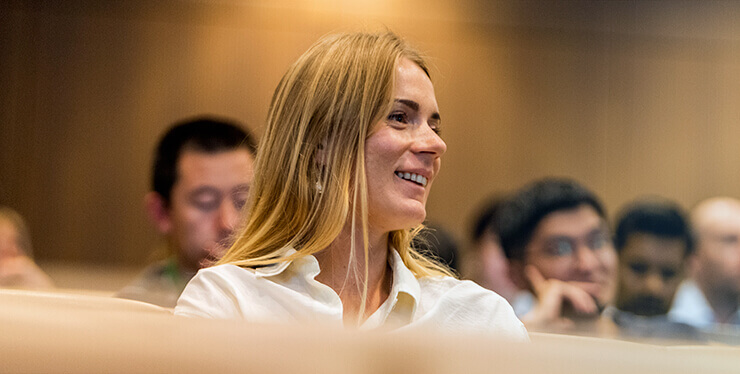
As the incoming CFO of Norway’s largest bank, DNB, Rasmus Figenschou (MBA 2009) faces a full agenda: safeguarding liquidity, meeting capital requirements, and strengthening investor confidence. He is a veteran banker with 20 years of experience at DNB, having held roles including Head of Division Corporate Banking, Head of Strategy and Group Development, Group EVP Payments and Innovation, and Group EVP at Business Banking Norway.
One of the critical challenges he confronts is fighting financial crime. Today, banks devote vast resources to anti-money-laundering (AML) and know-your-customer (KYC) efforts, employing far more staff and deploying far more technology than just a few years ago. Though less glamorous than deal-making or growth strategies, Figenschou emphasizes that these measures are vital to maintaining trust and stability in the financial system.
“A robust and stable banking system has always been important, but the fight against financial crime, both anti-money-laundering and terrorism financing, has become a much bigger focus,” Figenschou explains.
To meet this challenge, banks have made huge investments in systems, technology, and employee competence to detect suspicious activity.
“In many banks, up to 10% of staff now work full-time on AML and KYC efforts,” he adds.
The lunch that never happened
Regulation is also proving to be a catalyst for innovation across the industry. When the Revised Payment Services Directive (PSD2) was introduced, banks were initially wary of its requirement to open payment infrastructure to third parties. “The early narrative was that fintechs would eat banks for lunch,” Figenschou recalls. “But history has shown it’s much more about cooperation.”
These shifts have given rise to entirely new business models, transferring interest costs from consumers to retailers and creating fresh opportunities in lending. To stay at the forefront, DNB is investing heavily in both technology and innovative models to ensure it plays a central role in this evolving landscape.
For Figenschou, the most motivating part of his job is applying the business understanding he’s gained over the years at the bank to the strategic challenges DNB now faces. Developing expertise in new areas also fuels his passion for problem-solving.
“You get to learn new areas of expertise, from colleagues and from customers, and with that combined knowledge, their challenges become much more exciting to deal with and try to solve,” he says.
A global perspective
Figenschou’s path began in the US, where he earned his BA at Tufts University in Massachusetts, and relished the freedom to explore subjects outside a set curriculum. He took full advantage, signing up for subjects as varied as Chinese medicine, Greek drama, and macroeconomics. “It was like going into a candy store every semester,” he recalls, admitting it didn’t prepare him for a career in finance, as he only took one accounting course. Instead, he learned on the job in Texas as an investment banking analyst in the energy sector, and later with the same company in London, gaining practical skills and confidence along the way.
He says that in the US, employers are more relaxed about learning on the job, while in Europe, employees are often expected to hit the ground running. He also notes that CFOs, who once came exclusively from auditing or accounting backgrounds, are increasingly emerging from paths like his.
“Nowadays, it’s becoming more common to see career paths like mine, moving from the business and strategy side into the CFO role,” he says.
His career at DNB began as an analyst in the shipping and offshore division, which took him to Singapore and New York. A few years later, he lived and worked in Estonia as Head of Corporate Banking at DNB Pank Estonia. He was struck by the resilience and consensus he observed there. During the financial crisis, for instance, Estonia collectively agreed to a common pay cut to boost national competitiveness – an experience that left a lasting impression.
Living and working in different countries has given him a broader perspective, and he has learned to be flexible. These skills have helped him better anticipate opportunities, navigate challenges, and think creatively about solutions.
He was also surprised to find that, even within Norway, approaches to problem-solving vary by region. He notes that there’s always a balance between challenging and adapting: push too hard, and progress stalls; adapt too much, and your perspective may be lost.
“That balance is always there – it’s challenging but rewarding,” he says.

Staying connected
To continue learning and connecting with peers, Figenschou, an MBA graduate from 2009, recently joined the Norwegian alumni club’s board.
“My time at IMD during the MBA was so special, and I think the more time has passed since I completed it, the more I appreciate what we as a class went through, and how much we learned together and from each other.”
Meeting other alumni, reflecting on their shared IMD experience, and discussing their life choices has been particularly rewarding.
“It has been really fun and very rewarding. It’s been a great value add for me.”


